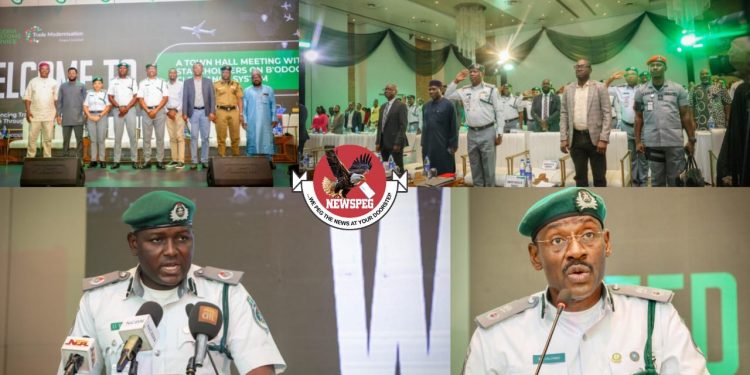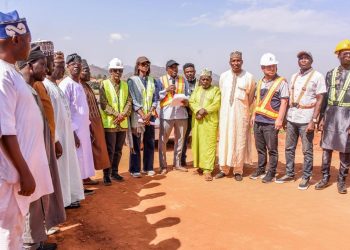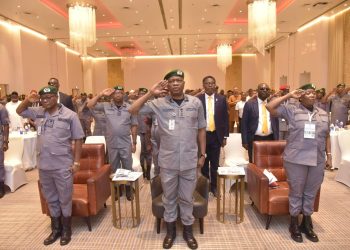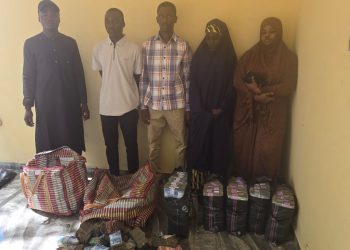By Nkechi Eze
The Comptroller-General of the Nigeria Customs Service (NCS), Adewale Adeniyi, has reaffirmed the Service’s unwavering commitment to a transparent, seamless, and inclusive transition to the newly launched B’Odogwu clearance platform, even as Nigeria takes centre stage as the current chair of the World Customs Organisation (WCO). Speaking during a town hall meeting held in Lagos on Monday, July 21, 2025, Adeniyi assured stakeholders that the Service is actively incorporating feedback into system optimisation efforts, with the overarching goal of transforming B’Odogwu into a benchmark for digital trade facilitation on the African continent and beyond.
The event, themed “Enhancing Trade Compliance and System Optimisation Through Stakeholder Engagement,” was convened to deepen dialogue between the NCS and its core stakeholders—including freight forwarders, importers, agents, and financial institutions—on the ongoing rollout and real-time usage of the B’Odogwu platform. It also served as a feedback mechanism to better understand field realities and challenges encountered by users.
Describing the town hall as a product of weeks-long engagement with sector actors, Adeniyi revealed that consultations had been conducted at various levels, some by the NCS ICT/Modernisation Department, others by support teams, and many personally by him. “It’s important we create this platform to allow you to share your concerns with us and describe your experience using B’Odogwu,” the CGC stated, noting that the Service’s long-term vision for the platform is rooted in stakeholder participation and open dialogue.
While acknowledging the presence of initial challenges, the CGC stressed that the reception to B’Odogwu had not been entirely negative. “We’ve received a number of positive responses from stakeholders, including freight forwarders and agents,” he said. He reiterated that the new clearance platform is a proudly Nigerian innovation, tailored to improve transparency, efficiency, and predictability within the trade value chain. “Our goal is to make B’Odogwu the reference point in trade facilitation. Now that Nigeria holds the WCO chairmanship, we want to show the world we can create and manage a home-grown system.”
Adeniyi also took time to address concerns surrounding the recently introduced 4% Free On Board (FOB) charge, clarifying that the measure is designed to simplify the importation process by consolidating previously scattered levies. “Once the 4% FOB takes effect, the 1% Comprehensive Import Supervision Scheme (CISS) will cease automatically. In addition, the 7% cost of collection currently charged will also be completely removed,” he explained.
He further clarified that under the new Act, the 4% FOB charge will be paid upfront, after which 100% of the revenue collected by the Customs Service will go directly into the Federation Account. “It’s a win-win for everyone. We’re simplifying the revenue structure and improving transparency while ensuring better compliance and ease of doing business,” he affirmed.
Earlier in her welcome address, the Deputy Comptroller-General in charge of ICT/Modernisation, DCG Kikelomo Adeola, emphasised the strategic importance of stakeholder collaboration in ensuring the success of B’Odogwu. She noted that the town hall was not merely a symbolic exercise but a vital mechanism for deepening trust and cooperation. “This town hall is not just another event; it’s a vital platform to engage our valued trade partners on the B’Odogwu Clearance System,” she said. Adeola hailed the platform as a locally conceptualised and developed solution, thanking stakeholders for their continued support in making it a national success story.
Echoing her sentiments, the Chairman of Trade Modernisation Project Limited (TMPL), Saleh Ahmadu, assured participants that the initiative is built with the long term in view, with strong commitments to innovation, investment, and user experience enhancement. “As we transition into a 21st-century Customs Service, TMPL is committed to investing in the right technology, people, and services. This project will significantly enhance the experience of all users in the trade value chain,” he said.
The town hall featured rich panel sessions exploring key topics such as “Overcoming Common Importer Challenges on B’Odogwu” and “Enhancing Transparency, Speed and Revenue through Full Participation.” Stakeholders shared practical insights, applauded the improved functionalities of the B’Odogwu system, but also raised concerns around delays in bank-related amendments, system migration hitches, and technical support response time.
The session culminated in a lively and extensive question-and-answer segment, where senior Customs officials provided clarifications on emerging concerns. Participants praised the CGC for his openness and commitment to continuous engagement, calling for sustained communication and ongoing system refinements.

















